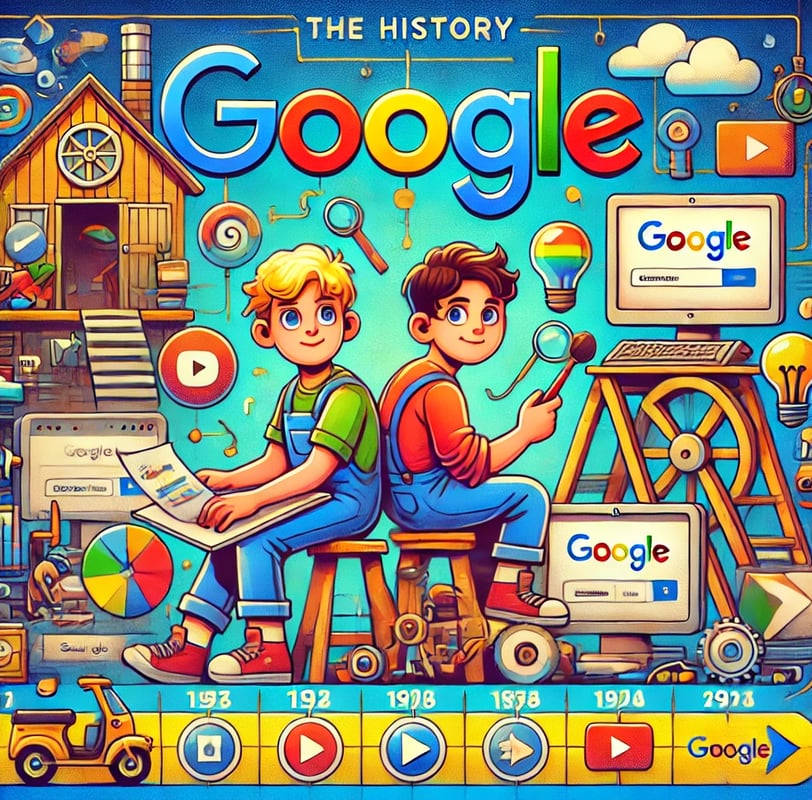The History of Google: From University Innovation to Global Dominance
Google is one of the most influential companies in the world, shaping how we search for information, consume content, and interact digitally. Since its founding, the company has evolved from a simple search engine into a technological empire dominating areas such as artificial intelligence, cloud computing, digital advertising, and even physical devices. In this article, we explore Google's origins, historical milestones, curiosities, growth, and global impact.
3/13/20252 min read


The Origin: The Meeting of Two Geniuses
Google's history began at Stanford University in 1995 when two Ph.D. students in computer science, Larry Page and Sergey Brin, met. Initially, they had differing opinions, but they soon realized they shared a common interest: improving how information was organized on the internet.
In 1996, they developed a project called "Backrub," a search engine based on link analysis to determine the relevance of web pages. This innovative concept became the foundation of what we now know as PageRank, the revolutionary algorithm that gave rise to Google.
The Birth of Google
In September 1998, Page and Brin officially founded Google Inc. and set up their first headquarters in a rented garage in California. The name "Google" was inspired by the mathematical term "googol," which represents the number 1 followed by 100 zeros, symbolizing their mission to organize an immense amount of information.
Google quickly stood out for its precision and speed in delivering search results, attracting users and investors. In 1999, the company received a $25 million investment from major venture capital firms, allowing for expansion.
Growth and Consolidation
In the 2000s, Google diversified its operations. In 2000, it launched Google Ads (formerly AdWords), transforming digital advertising by allowing businesses to pay for keyword-based ads.
In 2004, the company went public, raising over $1.6 billion. That same year, it launched Gmail, a revolutionary email service offering 1GB of free storage, an unprecedented innovation at the time.
In the following years, Google acquired strategic companies such as:
YouTube (2006): Became the world's leading video platform.
Android (2005): Turned Google into a giant in mobile operating systems.
DoubleClick (2007): Strengthened the company's dominance in digital advertising.
Achievements and Technological Advancements
Beyond its dominance in search and online advertising, Google invested heavily in artificial intelligence and innovation:
Google Chrome (2008): Launched a fast and efficient browser that became the market leader.
Google Drive (2012): Expanded cloud storage for users and businesses.
Google Assistant (2016): Advanced artificial intelligence with voice assistants.
DeepMind (2014): Acquired one of the world's leading AI companies.
Google Stadia (2019): Attempted to revolutionize cloud gaming.
Interesting Facts About Google
Google's first server was built using LEGO pieces to facilitate adjustments.
The "I'm Feeling Lucky" button is rarely used but remains on the site for tradition.
In 2015, the company restructured and created the holding Alphabet Inc., becoming its parent company.
Google maintains an innovative work environment with offices designed to stimulate creativity.
Challenges and Controversies
Despite its success, Google has faced various challenges:
Antitrust lawsuits for monopoly practices in the U.S. and Europe.
Privacy concerns involving data collection and the use of personal information.
Growing competition with companies like Amazon, Apple, and Microsoft in areas such as artificial intelligence and cloud computing.
Conclusion
Google has revolutionized the internet and how we access information. From a university garage to a global empire, the company continues to innovate and expand its influence. Its impact goes beyond technology, shaping our communication, work, and entertainment. It remains to be seen what the next steps of this innovation giant will be.
Explore
Discover diverse topics in one convenient hub.
Connect
Learn
contact@mindstormblog.com
© 2025. All rights reserved.


